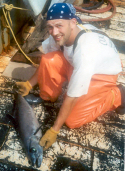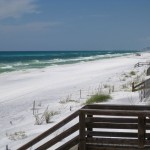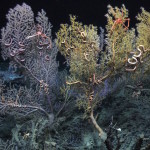 To understand how the oil spill affects the fisheries and fishing communities, I turned to Dr. Dave Kerstetter, a research scientist at Nova Southeastern University’s Oceanographic Center. Dave has a background in applied fishery science and is interested in the intersection between fisheries science and public policy.
To understand how the oil spill affects the fisheries and fishing communities, I turned to Dr. Dave Kerstetter, a research scientist at Nova Southeastern University’s Oceanographic Center. Dave has a background in applied fishery science and is interested in the intersection between fisheries science and public policy.
Kevin Zelnio: You are involved in the Oil Spill Response Task Force, a collaboration among many Floridian universities. What is your role in the Task Force and what do you hope to accomplish?
Dave Kerstetter: At this point, there’s little active interaction — at least not for most of us listed on the website — although there’s obviously lots of work going on individually and by the northern Gulf folks in general. This is also not meant in any way to replace or disparage the massive increase in effort by state and federal marine agencies to conduct pre-oil sampling and monitoring. As I understand it, the point of the Task Force was to proactively organize the Florida marine academic resources rather than take the traditional piecemeal approach that’s been seen in other sorts of large-scale events.
As the president-elect of the Florida Chapter of the American Fisheries Society, I know first-hand that we have world-class fisheries and other marine-related scientists here in the state. The challenge is how to best use us in monitoring, assessing, and ultimately mitigating the effects of this spill. There will be an e-mail listserve set up shortly, which I expect will increase dramatically these academic interactions, as would the spill reaching the Loop Current and thereby suddenly affecting a much broader area very, very quickly.
KZ: There are already reports of many fishermen’s livelihoods affected by the oil spill. As a fisheries scientist you have a unique position where you interact with the fishing industry and the fish. Can you predict how this affects the near term and long term commercial fisheries in the Gulf of Mexico from the perspective of the fishermen and the fish?
DK: What a broad question! Yes, there are already many commercial fishers and recreational anglers and charter captains who are being negatively affected by the spill. This can happen either directly (see the attached .pdf on the latest time-area closure by NOAA Fisheries) by stopping fisheries completely or indirectly through public perception of their products. We tend not to think about these indirect impacts, but they can be just as real; customers canceling orders of oysters from non-affected grounds as a commercial example or clients canceling upcoming charter trips in the Keys have very real impacts nonetheless on these captains. The Miami Herald, for example, has been very good over the course of this event in providing on-the-ground coverage of these impacts to fisheries.
Many other impacts are infrequently considered by non-fisheries folks. During a constituent conference call earlier this week with NOAA, one of the Keys crab pot fishers discussed how federal regulations might consider fishing gear coated with oil as toxic waste, with all the resulting disposal difficulties for a small owner/operator with 250 pots and for a fishery with several hundred participants. I don’t think this has been the case yet, but these events have historically affected oil and fuel prices, which also have very immediate impacts on vessels using 100 gallons of diesel per fishing day. A recent concern has been raised about whether the simple transit of a fishing vessel through the affected area requires it to be specially cleaned, which NOAA is still addressing. There are many such indirect effects, many of which we just don’t know yet.
The direct impacts — other than the biological ones I’ll address below — are still rather minor for the Gulf as a whole with most fisheries other than the shrimp and local recreational ones. The shrimpers have to deal with state time-area closures as well as federal regulations, and trying to balance those out economically (e.g., “Do I take my boat from Alabama to Texas for only a two-week season?”) will remain a challenge. The pelagic longline fleet targeting yellowfin tuna has apparently moved into other, non-affected portions of the Gulf, which makes it one of the lucky mobile ones. I’ve been getting reports that many fishing tournaments in the northern Gulf have been or are considering being canceled, many of which bring millions into local economies. The real challenge will be if (when?) the spill makes it into the Loop Current, which will then immediately make this a state-wide problem for many additional fisheries.
KZ: Which particular fisheries will be the most susceptible to damage from the oil spill and when would you expect them to recover?
DK: Most of what happens at this point — from a fisheries perspective at least — depends on where the oil actually goes. (Sure, the oil forming a slick at the surface is a horrible thing for fish eggs and larvae, many of which are pelagic at those life stages, but you’ve covered some of that already.) If the oil stays offshore, then you affect the pelagic and coastal pelagic fisheries; e.g., the commercial yellowfin tuna fishery out of Louisiana and the kingfish recreational fishery in the northern Gulf. If it stays offshore, but goes down, through natural or chemical degradation or some other process, then you’ll impact the snapper-grouper and shrimp fisheries. Should it go inland, then you’ll have impacts on all your important coastal fisheries, including the poster-child for recreational fisheries restoration, the redfish (red drum). You’ll also wipe out the (market and/or) fishery for oysters and blue crabs, and it’ll have negative larger effects on every species dependent on coastal saltmarsh habitats.
If (once) it gets into the Loop Current, then take these same impacts, change “saltmarsh” to “mangrove”, then repeat for impacts along the southern Florida coast. One of the more interesting things I’ve learned this past week was that the dean of the NSU Oceanographic Center did work with oil spills in tropical habitats. He commented that chemical oil dispersants were very toxic to corals, but not so to mangroves, who actually did better if the oil coming inland to their prop roots was broken up using those same dispersants. Both environments are vital to many of our species down here, so having a King Solomon-style “splitting the baby” moment of which habitat to ultimately mitigate may be something already being considered at state and federal levels.
KZ: How do ecological catastrophes like this affect management decisions for these fisheries?
DK: This remains to be seen. We have a meeting of the HMS Advisory Panel — kind of the trans-regional substitute for a fishery management council that advises NOAA Fisheries on highly migratory species (HMS) management — this week in Silver Spring, and while this is on the agenda, I don’t know what NOAA’s going to say or do about it. Many of the individual fisheries are state or regional fishery management council managed, which makes them a bit more flexible in terms of acting quickly for temporary openings/closings. However, tracking those changes is tough, as you’ve got to know or monitor each state individually. It does appear, however, that there’s been a much greater recognition of fisheries economic and social impacts today versus the Exxon Valdez incident, which is good to see from my perspective.
In a larger sense, it’s hard to build such events into fisheries management regimes; simply put, losing entire year-classes is tough to anticipate. Most management actions are based on such small numbers of fish or other marine animals that these large-scale events will sometimes wipe out progress over years of work and sacrifice. We could potentially lose more turtles in this spill than were saved with circle hooks, for example. Alternatively, it’s hard to argue for a catch-and-release fishery for a fish stock about to be impacted by the spill. For my particular sort of applied fisheries research, it’s hard to get fishers to participate in cooperative work when your margins for management are so narrow and easily breached, and no-one I’ve talked with — NO-ONE — has any delusion that BP will pay for much of anything regarding the mitigation of biological or economic fisheries impacts. While the ecological community seems to be more in a wait-and-see attitude about BP funding biological assessments, I side more pessimistically with the fisheries folks, our President’s continuing happy talk notwithstanding.
Thank you for your time Dave! You provided a lot of food for thought and a great, informative perspective. Good luck with your hard in the Gulf.
Share the post "How the Oil Spill Affects Fisheries: Interview with Dr. Dave Kerstetter"






This is truly sad, and I hope this will show people to turn to alternate energy.